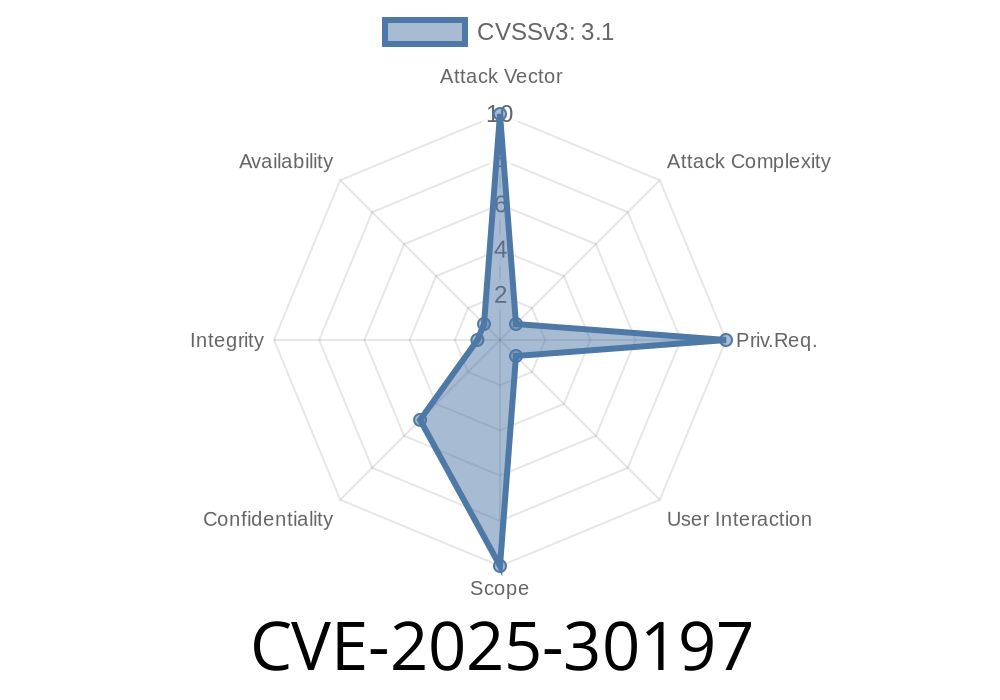A new vulnerability, CVE-2025-30197, has been discovered in the Jenkins Zoho QEngine Plugin, affecting versions up to and including 1..29.vfa_cc23396502. This flaw centers around a security oversight: the plugin does not properly mask the QEngine API Key field in its configuration UI. This makes it possible for anyone who can view the configuration to see and potentially steal the sensitive API Key, leading to unauthorized access to Zoho QEngine resources.
In this post, we'll break down what's wrong, how it can be exploited (with a code example), and ways to patch or mitigate the risk.
What Is the Jenkins Zoho QEngine Plugin?
The Jenkins Zoho QEngine Plugin connects Jenkins with Zoho QEngine, allowing pipeline jobs to run and interact with QEngine automated tests through its API. As part of the configuration, users must enter a QEngine API Key—a sensitive credential that allows full access to QEngine projects.
Nature of the Vulnerability
Normally, API keys or passwords in web forms should be masked (using <input type="password">), so that fishing eyes, screenshots, or accidental exposure during a demo session don’t leak these secrets. Unfortunately, in Jenkins Zoho QEngine Plugin 1..29.vfa_cc23396502 and before, the API Key field in the plugin configuration is a plain text field:
<!-- Inside the plugin config.jelly file -->
<f:entry title="QEngine API Key" field="apiKey">
<f:textbox/>
</f:entry>
That <f:textbox/> creates a regular text input, so the API Key is visible to anyone with view or edit access to Jenkins configuration.
Why Is This Dangerous?
- Accidental Exposure: Admins or job maintainers might copy-paste configuration information where others can see it.
Shoulder Surfing: In open offices or shared environments, someone could spot the API Key.
- Screenshots: Documentation, screenshots, or screen recordings might capture and expose the API Key.
1. Open Jenkins and navigate to the Zoho QEngine plugin configuration
http://<jenkins-server>/configure
You'll see something like this in your browser
<input id="jenkins-zoho-qengine-plugin-apiKey" name="apiKey" value="Zh-4p1-k3y-EXAMPLE" class="setting-input">
Notice the type="text" (default for <input>), not "password".
3. Configuring the field to mask the key (how it *should* be)
<f:entry title="QEngine API Key" field="apiKey">
<f:password/>
</f:entry>
This change would turn the input into
<input type="password" ...>
Now, the browser shows bullets instead—making stealing the key much harder.
A simple but real-world attack chain might go like this
1. Attacker gets configuration permissions in Jenkins (by phishing, credential stuffing, or insider privilege).
Views plugin configuration, where API key is plainly visible.
3. Copies the key and uses it to interact with Zoho QEngine outside of Jenkins, stealing your test data or executing malicious test runs.
Covers their tracks, leaving your team dealing with stolen secrets.
*No fancy exploit code required—mere viewing is enough!*
Reference Links
- Jenkins Security Advisory (if/when published)
- Zoho QEngine Documentation
- Plugin Issue Report / Source code (GitHub)
- NVD Entry - CVE-2025-30197 *(when available)*
## How to Fix/Mitigate
Limit privileges: Only give configuration access to trusted users.
- Audit API Key usage: If you suspect exposure, generate a new key in Zoho QEngine and update Jenkins accordingly.
If You Maintain the Plugin
- Replace <f:textbox/> with <f:password/> in all Jelly UI files where API Keys or passwords are used.
Conclusion
CVE-2025-30197 is a clear demonstration that even UI details can have real security implications. Masking credentials on all configuration screens should be a baseline expectation—this vulnerability underscores the risk of overlooking such details.
If you use Jenkins Zoho QEngine Plugin, check your version and restrict configuration page access until a fixed release is available. Update, rotate your API keys, and keep your secrets secret!
*Got questions, tips, or need support? Head to the Jenkins Security Mailing List or Zoho QEngine Community.*
Timeline
Published on: 03/19/2025 16:15:34 UTC
Last modified on: 03/21/2025 14:15:17 UTC
